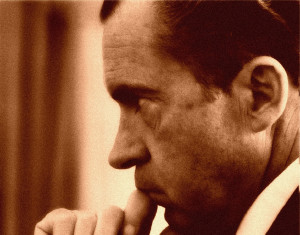REVIEW: The Last of the President’s Men
[by Mark Safranski, a.k.a. “zen“]

The Last of the President’s Men by Bob Woodward
Last of the President’s Men is a short but revealing work by Bob Woodward, the prolific author on American presidents who returns full circle to the subject that made Woodward a celebrity journalist, Richard Nixon and Watergate. Specifically, Last of the President’s Men is about the relationship between Richard Nixon and Alexander Butterfield, the man who revealed to the world Nixon’s secret White House taping system which ultimately led to Nixon’s resignation under the sure threat of impeachment. Butterfield, who unsuccessfully attempted a book of his own, is virtually Woodward’s co-author here and it is Butterfield’s voluminous personal papers, carted out from his White House office against the rules and hidden away for decades, that serve as the evidentiary basis of this book.
Aside from the precise description of how the taping system came to be installed in the Oval Office, a task Nixon’s feared chief of staff, H.R. Haldeman, delegated to Butterfield, the focus is on Butterfield’s role as a top aide to both Nixon and Haldeman, a post to which Butterfield ascended only with considerable difficulty after first navigating Richard Nixon’s neurotic quirks, becoming in essence, “Haldeman’s Haldeman”. Butterfield does not come across as an entirely admirable character. Like Mark Felt who in turning informer during Watergate had acted out of frustrated ambition, Alexander Butterfield’s betrayal of Richard Nixon had less to do with safeguarding the Constitution from an out of control president than the reaction of an unappreciated servant who had noted every slight and had nursed his grievances.
What shines through in the story is how truly weird and brittle Nixon had become in dealing with other human beings by the time he had reached the presidency. It is very difficult to reconcile the Richard Nixon of The Last of the President’s Men who had paralyzing anxiety attacks over working with – or even meeting- new staff with the Nixon who wrangled with lawyers, FBI agents and fellow Congressmen in investigating Alger Hiss, who forcefully debated Nikita Khrushchev or who remained steady when his limousine was attacked by a Communist mob in Venezuela. Perhaps Nixon grew worse with age or perhaps as president, Nixon finally had the means to keep unwanted people – and that would be nearly everyone – at bay. The portrait painted by Woodward of Richard Nixon is of a desperately lonely, misanthropic figure, inept at and pained by normal social relations to such an extent that he kept even his wife and children at a strange remove.
Yet Nixon had his gifts and even Woodward allows this, particularly his “strategic mind” which Woodward credits for Nixon managing to retain to this day, admirers. Nixon, for all his social awkwardness (which in sections is downright painful to read and I speak as someone deeply versed in things Nixon) had a penetrating intelligence that let him understand the board and the players, the moves they might make and their strengths and weaknesses of which Nixon might take advantage. Had Richard Nixon not outsmarted himself with the taping system that Butterfield meticulously oversaw, he most likely would have prevailed in Watergate over his enemies and left office after two full terms. Nixon was far smarter than his critics gave him credit at the time and far more ruthlessly manipulative than his defenders are willing to concede to this day.
The Last of the President’s Men is fast read but an interesting one. Recommended.




February 3rd, 2016 at 2:43 pm
This sounds good. It sounds like a valuable addition to the Nixon canon. However his depiction of Nixon, as with any observer, has to be filtered for bias and ax-grinding.
February 4th, 2016 at 2:13 am
But wasn’t the fact that he wanted a taping system admirable? It seems to me that, in that one act, Nixon understood himself and his office better than anyone, which I think is admirable.
*
I mean, I could see someone like Ted Cruz installing a system even now, but it would be, after watching a pre-adult selfie of him ranting (and in my opinion), out of some type of narcissus want and not for some need of a noble cause.
*
And that cause: for some other generation waiting.